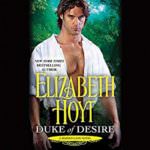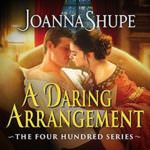 Narrated by Ashford MacNab
Narrated by Ashford MacNab
In Sweetest Scoundrel, the ninth book in her long-running Maiden Lane series set in Georgian London, Elizabeth Hoyt once again features a member of the Makepeace family. In it, big, brawny and bawdy Asa, who has hovered in the background in a number of the earlier books, finally gets his own story.
Known to London’s entertainment world as Mr Harte, Asa Makepeace is the owner of Harte’s Folly, the popular pleasure garden which burned down at the end of Duke of Midnight, and which listeners have visited as it undergoes renovations in both Darling Beast and Dearest Rogue (books 7 and 8 respectively). Now, the repairs are almost complete and the garden is scheduled for a spectacular reopening, complete with a new theatre, a newly commissioned opera and the magnificent gardens designed by Apollo, Viscount Kilbourne. Well, it would be were it not for the fact that Asa’s backer – the enigmatic Duke of Montgomery – has just threatened to cut off funding for the project. Or more accurately, his agent, fed up with receiving no response to requests to see the account books, has threatened to withdraw the duke’s support.
Asa, being a “big picture” kinda guy, is furious at the idea that a mere number-cruncher could destroy everything he’s ever wanted and worked for, but realises he must rein in his temper if he is to get what he wants. So he invites Montgomery’s agent – who is actually the duke’s half-sister, Miss Eve Dinwoody – to visit the folly, hoping to impress her with the progress of the work and the scope of his ideas.
Eve Dinwoody is not at all the sort of woman to whom Asa would normally give a second glance. At their first meeting, he dismisses her as “shovel faced” and thinks she’s an interfering harpy, but as they begin to form a working relationship, he starts to reassess her and comes to appreciate her intelligence and insight, as well as to sense an untapped sensuality that intrigues him. For her part, Eve is completely unable to help her growing fascination with Asa, whose blatant, earthy sexuality and almost overwhelming masculinity make him the sort of man from whom she’d normally run a mile.
As Eve and Asa ease into friendship, the work on the theatre and gardens continues to progress, but a series of unaccountable “accidents” threatens not only to ruin Asa financially, but to endanger the lives of those around him. He has unscrupulous competitors, men who would stop at almost nothing to see him go out of business – but there’s something to indicate that these events could be more than the work of a rival.
Sweetest Scoundrel is a thoroughly enjoyable story and I especially liked the parts in which Ms Hoyt gives us a glimpse into the workings of eighteenth century theatre life. Harte’s Folly is much more than a theatre; it’s an entertainment complex, really, but the theatre is its heart, and this element of the story adds a lovely touch of background colour. The romance between the larger-than-life, sensual Asa and the prim, retiring Eve is very much one of opposites, and yet they just ‘work’ as a couple, each of them highlighting and bringing out admirable qualities in the other. Asa is plain-spoken to the point of crudeness but is a delicious hero for all that, his utter confidence that he is good at what he does – whether it’s building a theatre or satisfying a woman – something that makes him very attractive. He’s bold, brash and quick to anger, yet with Eve he begins to show a gentler, more protective side, especially as he comes to understand the horrific reality behind her fear of men. Eve is still haunted by a terrible event in her childhood which has left her emotionally scarred, but the unfamiliar and unexpected stirrings of attraction Asa engenders in her make her determine to reclaim her life. This is one of the most poignant aspects of the novel; while Asa may be the impetus for her decision, it’s Eve who decides she’s had enough of being alone and living in fear, and makes the decision to get out there and embrace life.
The romance is well-developed on the whole, although I do have a small niggle with the way Asa goes so quickly from thinking Eve unattractive to wanting to get under her skirts. Other than that, though, the pacing is very good; Ms Hoyt doesn’t make the mistake of trying to rush things given Eve’s issues, and that gives her the opportunity to make the most of Asa’s blatant, bawdy sexuality, having him seduce Eve with words (a lot of them naughty ones!) long before he so much as touches her.
I’ve enjoyed all of Ashford MacNab’s narrations in this series, and she is very much the ‘voice of Maiden Lane’ for me. That doesn’t mean her narrations are faultless, but on the whole her characterisations and the wealth of emotion she brings to the narrative and dialogue are strong enough for me to be able to overlook any minor technical weaknesses. Her performance overall is another strong one, with clearly differentiated characters, well-paced narrative and an obvious affinity with the material. I will, however, admit to having some concerns going in as to how she was going to manage to find the right tone for Asa, who is described frequently as being an incredibly large man, given that her voice is very light and not particularly deep. She pulls it off creditably with a slight lowering of pitch and by adding a harder edge to her tone, although this has the unfortunate effect of adding a rather nasal quality to it – which is something I’ve noticed about her portrayals of the male protagonists of the other books, too. One thing I particularly liked was Ms MacNab’s decision to adopt two different vocal characterisations for Asa, even though this is not indicated in the text. When he speaks as Harte, she drops h’s and t’s and applies glottal stops to his dialogue, thus giving him a distinctly lower class accent; but when he speaks as Asa, his speech is more refined and her diction is clearer. It works well as an acting choice, but the problem is that it’s inconsistent. There are times when Asa is supposed to be Harte that Ms MacNab seems to have forgotten her decision to portray him in two different ways and uses her ‘Asa’ voice instead of her ‘Harte’ one.
But these issues don’t get in the way of the story, and as I’ve said, Ms MacNab brings so many other positive elements to her performance, that it’s possible to overlook the weaker ones. Sweetest Scoundrel is another strong addition to this series, and I’m sure fans of both author and narrator will love it.
Caz
Narration: B
Book Content: B+
Steam Factor: Glad I had my earbuds in
Violence Rating: Minimal
Genre: Historical Romance
Publisher: Hachette Audio
Sweetest Scoundrel was provided to AudioGals by Hachette Audio for a review.
[jwl-utmce-widget id=32435]



Great review. I am a big fan of the Maiden Lane series. Ashford MacNab IS the voice of the Maiden Lane series for me. I think she does a great job. I was really impressed with how she was able to make all the series character voices so distinct, especially in the scene where the entire Makepeace family is all together.
Yes, the two books (5&6) she didn’t narrate just weren’t right, were they?
No, they weren’t. :-/
My pie-in-the-sky wish for the series is for Ashford to re-record those two.
Same here, especially book 5 – the reviews on Audible (last time I looked, which was some time ago) were universally dreadful.